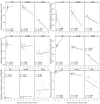Cerebral amyloidosis associated with cognitive decline in autosomal dominant Alzheimer disease
- PMID: 26245925
- PMCID: PMC4553024
- DOI: 10.1212/WNL.0000000000001903
Cerebral amyloidosis associated with cognitive decline in autosomal dominant Alzheimer disease
Abstract
Objective: To investigate the associations of cerebral amyloidosis with concurrent cognitive performance and with longitudinal cognitive decline in asymptomatic and symptomatic stages of autosomal dominant Alzheimer disease (ADAD).
Methods: Two hundred sixty-three participants enrolled in the Dominantly Inherited Alzheimer Network observational study underwent neuropsychological evaluation as well as PET scans with Pittsburgh compound B. One hundred twenty-one participants completed at least 1 follow-up neuropsychological evaluation. Four composite cognitive measures representing global cognition, episodic memory, language, and working memory were generated using z scores from a battery of 13 standard neuropsychological tests. General linear mixed-effects models were used to investigate the relationship between baseline cerebral amyloidosis and baseline cognitive performance and whether baseline cerebral amyloidosis predicts cognitive change over time (mean follow-up 2.32 years ± 0.92, range 0.89-4.19) after controlling for estimated years from expected symptom onset, APOE ε4 allelic status, and education.
Results: In asymptomatic mutation carriers, amyloid burden was not associated with baseline cognitive functioning but was significantly predictive of longitudinal decline in episodic memory. In symptomatic mutation carriers, cerebral amyloidosis was correlated with worse baseline performance in multiple cognitive composites and predicted greater decline over time in global cognition, working memory, and Mini-Mental State Examination.
Conclusions: Cerebral amyloidosis predicts longitudinal episodic memory decline in presymptomatic ADAD and multidomain cognitive decline in symptomatic ADAD. These findings imply that amyloidosis in the brain is an indicator of early cognitive decline and provides a useful outcome measure for early assessment and prevention treatment trials.
© 2015 American Academy of Neurology.
Figures


Comment in
-
Is dominantly inherited Alzheimer disease a clone of sporadic Alzheimer disease?Neurology. 2015 Sep 1;85(9):750-1. doi: 10.1212/WNL.0000000000001897. Epub 2015 Aug 5. Neurology. 2015. PMID: 26245927 No abstract available.
References
-
- Hardy JA, Higgins GA. Alzheimer's disease: the amyloid cascade hypothesis. Science 1992;256:184–185. - PubMed
-
- Arriagada PV, Growdon JH, Hedley-Whyte ET, Hyman BT. Neurofibrillary tangles but not senile plaques parallel duration and severity of Alzheimer's disease. Neurology 1992;42:631–639. - PubMed
-
- Naslund J, Haroutunian V, Mohs R, et al. Correlation between elevated levels of amyloid beta-peptide in the brain and cognitive decline. JAMA 2000;283:1571–1577. - PubMed
-
- Ingelsson M, Fukumoto H, Newell KL, et al. Early Abeta accumulation and progressive synaptic loss, gliosis, and tangle formation in AD brain. Neurology 2004;62:925–931. - PubMed
Publication types
MeSH terms
Substances
Grants and funding
LinkOut - more resources
Full Text Sources
Medical
Miscellaneous
